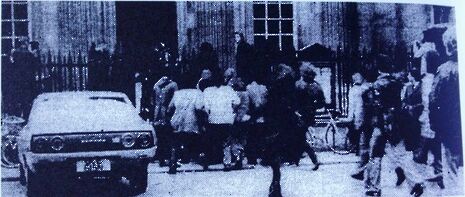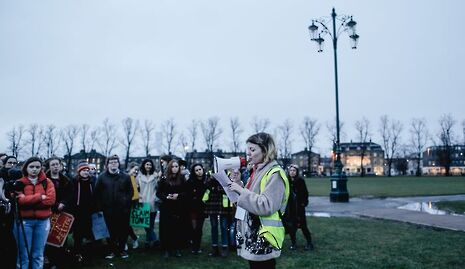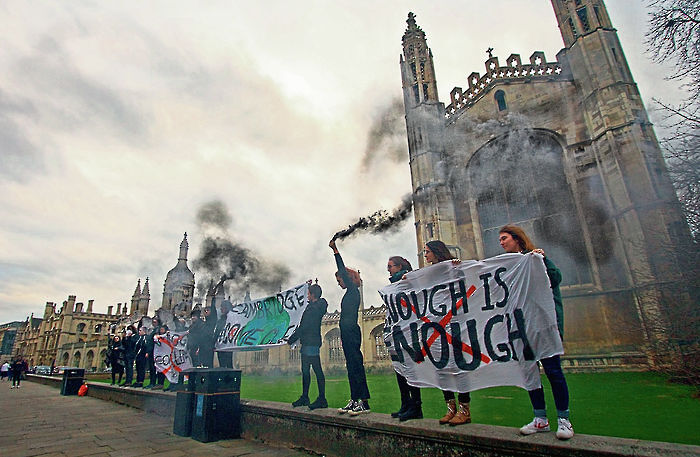Preserving a legacy of feminist action helps carve out spaces for the present
CUSU Women’s officer Claire Sosienski Smith discusses the importance of claiming spaces of refuge within the university by mapping a history of feminist organising

In our roles as CUSU Welfare and Rights Officer and Women’s Officer, Christine Pungong and I spend a lot of time coming together with people to organise campaigns, participate in panels, and train volunteers for their roles on college committees. These processes of passing on skills, which we have learnt and continue to learn from these environments, serve to create networks and communities of people outside of traditional collegiate and university structures.
These spaces inhabit us as much as we inhabit them.
Inhabiting space is important in a university setting that can often make us feel as if we are uniquely struggling to feel comfortable. If we do not remember our history, and the influence of women and non-binary people before us, we often feel lost. The CUSU Women’s Campaign, in collaboration with the CUSU-GU Welfare portfolio, is creating a psychogeographical map to visually represent feminist spaces, memories and communities in Cambridge.
“Recording our experiences of feminist joy, friendship and memory treats us and our communities of care as important acts of consciousness raising and change making.”
The extent to which you feel able to enter a space impacts how much you can participate in that space. For this reason, there have been a lot of institutional changes for women and non-binary people and people of colour in their ability to record experiences of gendered and racial harassment in recent times. Breaking the Silence was launched in March 2017 as a series of initiatives from the university to target sexual harassment within the institution. As part of this, online reporting tools were established to offer survivors multiple options of recording instances of sexual harassment, including launching informal and formal complaints to find a justice that is meaningful to them.
These procedures formalise the community-based ways in which the Women’s Campaign would hear and support the disclosures of those experiencing sexual harassment. The Breaking the Silence reporting tools come from the recommendations suggested in reports written by Women’s officers in 2014 and 2015, initiated by the need for the university administration to take seriously the existence of sexual assault within Cambridge.

This year, Mónica Moreno Figueroa launched the sociology department’s End Everyday Racism project, which anonymously records and geolocates instances of racial harassment in Cambridge. These projects are essential for creating maps and records of Cambridge which feed into campaigning work aiming to make these spaces safer and more accessible for people who experience structural forms of oppression.
Yet, in campaigning for, and even simply caring about, the creation of spaces that are more welcoming, we can often be overwhelmed by the current situation, and the knowledge that these spaces are not meant for us to survive. Christine and I are therefore seeking to provide a psychogeographical map of the spaces and moments that gave us a key to survival here. My experience as a student, and now a full time sabbatical officer, has been shaped by campaigning for change on how we record, reflect and seek justice for survivors of gendered violence. I learnt, and continue to learn, how to do this through the spaces of solidarity and feminist joy that exist in pockets of this university, between the intimidating architecture and locked doors.
This is not to say that our narratives must only speak of joy, happiness and friendship, and for some people, it may not be the right time to reflect on memories of Cambridge and community building within it. Yet, for those who are able to, recording the experiences of women and non-binary students and staff members of the university is an important and radical act. It imbues this place with the histories of women and non-binary people, constructing psychological maps for those who currently feel alienated by the social and physical structures that make up the university.
Archiving these memories and celebrating them through the construction of a psychogeographical map enables us to see how we have found spaces of feminist resistance and joy. It reminds me that we too are the university: the students’ unions, the Women’s Campaign and student activists create alternative visions of the university and how we use space.
“Inhabiting space has been important in a university setting that can often make us feel as if we are uniquely struggling to feel comfortable.”
Senate House is a space that I did not enter for the first two and a half years of my degree. I saw it as a space that was not for me. However, it was also the space where the Women’s Campaign called for a discussion on reforming the disciplinary procedure in my final year as an undergraduate, altering my perception of the building and its purpose. In 1975, it was also the location of the largest occupation in the university’s history. The Nursery Action Group, one of the campaigns of the newly formed Women’s Campaign, staged an occupation which saw around 1,600 people refuse to leave the building until the university agreed to provide affordable in-house childcare.
The act of refusing to accept the situation as it currently stands has a long history in feminist spaces, and it is important that we acknowledge, learn from and archive our current work in order to strengthen our movement. Space becomes meaningful when it is inhabited by people, and it is important to recognise the ways in which we have claimed spaces for ourselves.
Our annual Reclaim the Night marches, organised by the Women’s Campaign for women and non-binary people across the city of Cambridge, can feel like a contradiction: why are we reclaiming the night, when we never had it in the first place? I see the continued power of women and non-binary people claiming space in the university and city as demonstration of the fact that we can imagine better alternatives than the narratives enforced by traditions and regulations that never considered our existence.
Recording our experiences of feminist joy, friendship and memory treats us and our communities of care as important acts of consciousness raising and change making. If you are a woman or non-binary student or staff member at the university, or ever have been, please fill out our online form before the 31st December, and share it with your friends, family members and classmates.
The responses to the survey, and conversations I have had while the questionnaire has been open, strengthen me in our feminist campaigning work, which would not exist without the legacy of feminist communities before us. These responses offer me the knowledge that, although it has not always been the case, these streets can be claimed as our streets, and this university can become our university.
 News / Colleges charge different rents for the same Castle Street accommodation2 March 2026
News / Colleges charge different rents for the same Castle Street accommodation2 March 2026 News / News in Brief: waterworks, wine woes, and workplace wins 1 March 2026
News / News in Brief: waterworks, wine woes, and workplace wins 1 March 2026 News / Climate activists protest for ‘ethical careers policy’1 March 2026
News / Climate activists protest for ‘ethical careers policy’1 March 2026 News / Angela Merkel among Cambridge honorary degree nominees27 February 2026
News / Angela Merkel among Cambridge honorary degree nominees27 February 2026 News / Private school teacher who lied about Cambridge degree barred from teaching27 February 2026
News / Private school teacher who lied about Cambridge degree barred from teaching27 February 2026









